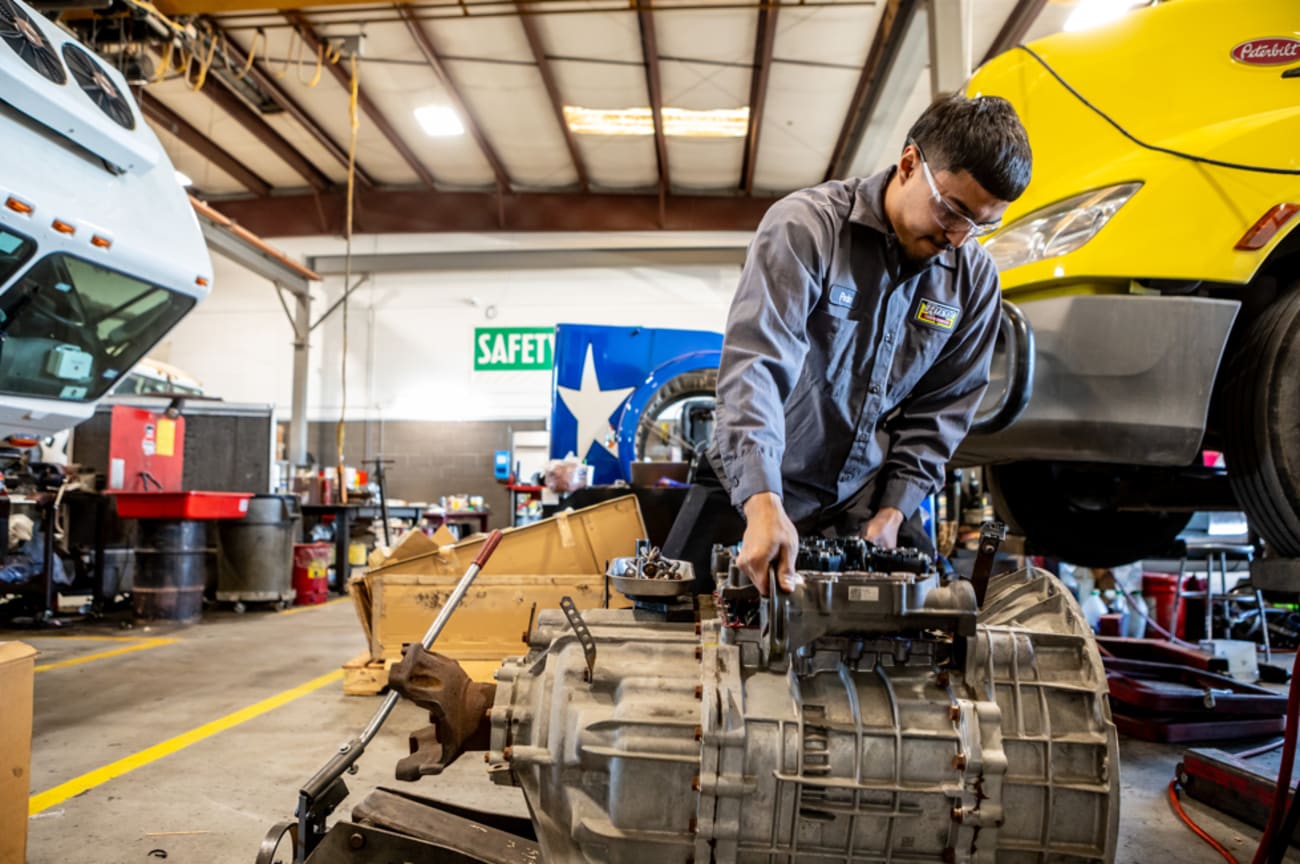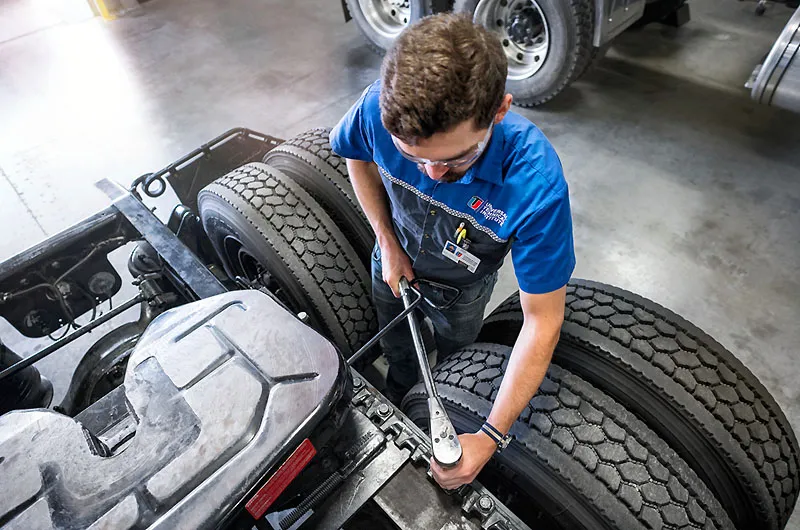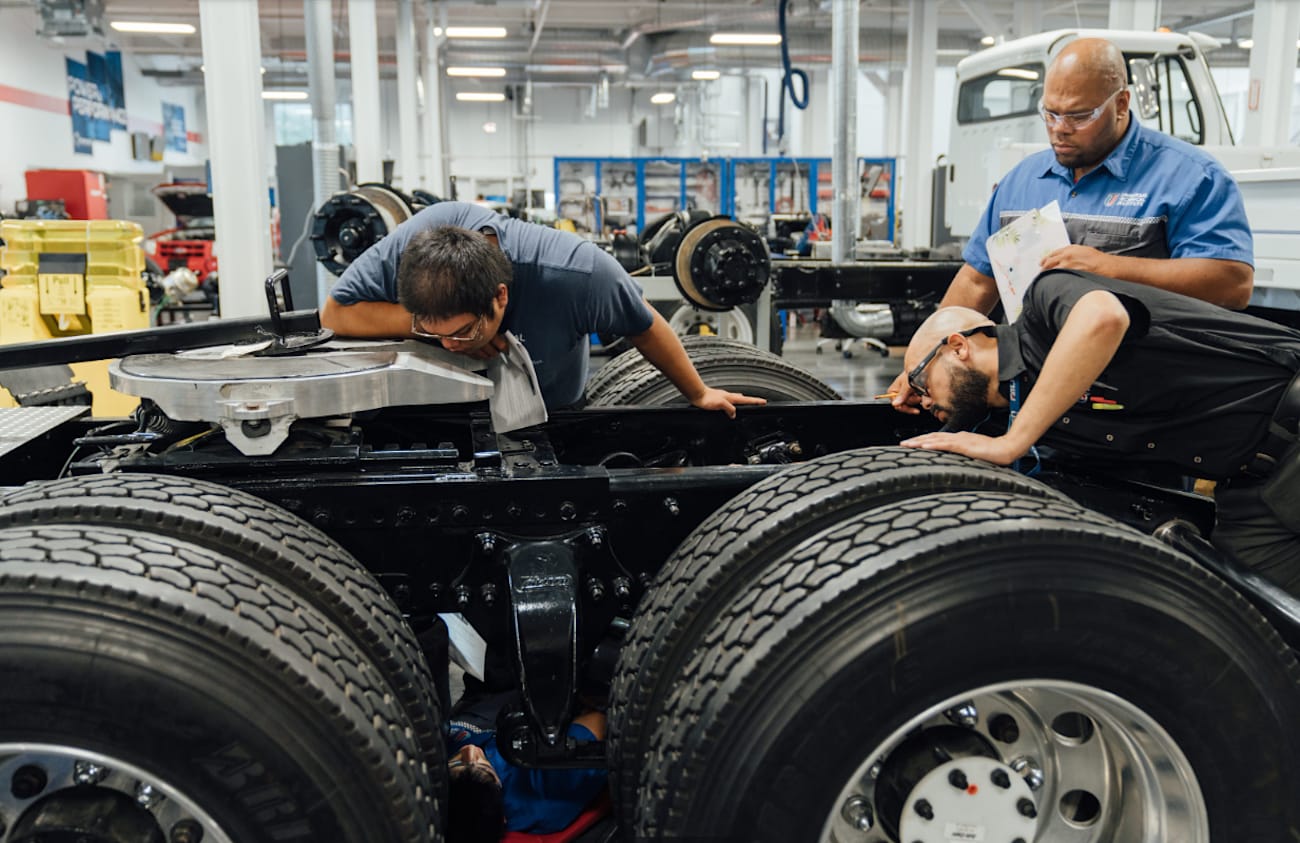What Is Diesel Technology?
Diesel technology is advancing to become more efficient and environmentally friendly. Click to learn more about diesel technology.
Heavy-duty diesel mechanics have the important role of working on equipment and vehicles that are powered by diesel enginesincluding anything from semitrucks to generators and other heavy equipment.
These hands-on professionals are key in maintaining our daily lives and operations.
But what does a heavy-duty diesel mechanic do, exactly? Why are they so important?
If you’re interested in training to pursue a career as a heavy-duty diesel mechanic, it’s important to understand what exactly this job looks like. Keep reading to find out more about the job and the steps you can take to train for this career path!

Photo credit: UTI
A diesel truck technician is responsible for the diagnosis, upkeep and repair of diesel engines present in large vehicles like trucks. They identify mechanical issues, complete routine inspection checks and perform necessary repairs to ensure the optimal performance of the vehicle.
Many vehicles use diesel engines, especially semitrucks, which transport goods and products across the country, and buses that take people where they need to be. There are also many machines in the construction, agricultural and railway industries that use diesel technology.
Duties of a heavy-duty diesel mechanic can vary depending on the equipment or vehicle they’re working on and can include:
Being a heavy diesel mechanic is a physical job that requires a lot of standing, climbing, crawling and walking for periods of time. Depending on what’s being worked on, heavy-duty diesel mechanics can also be exposed to varying weather conditions. It takes someone who has attention to detail, a tough work ethic and enough physical endurance to succeed in this role!
Read: Light-Duty vs. Heavy-Duty Diesel Training: Which Is Right for Me?

Photo credit: UTI
Before considering a career in diesel, it helps to gather some basic information. Estimated salary and a general job outlook can be determining factors for some when making a decision.
Those getting started in the heavy-duty diesel mechanic field will likely need to pursue entry-level positions to gain experience working with these engines and machines. The Bureau of Labor Statistics (BLS) is a resource that can help provide an idea of what to expect for a median annual salary in the field.
According to the BLS, the median annual salary for bus and truck mechanics and diesel engine specialists in the United States was $58,970 in May 2023.29 This means half of diesel technicians earned more and half earned less. Keep in mind that a diesel technician’s salary depends on several factors, including experience, employer, demand and cost of living in the area.
The BLS also projects more than 25,000 estimated average annual diesel job openings in the U.S.43These skilled technicians help make daily tasks possible in this country. Employers are on the lookout for those with the right blend of education and training to help fill these roles!
Read: How Long Does It Take To Become a Diesel Mechanic?
Once you’ve decided to pursue a career as a heavy equipment diesel mechanic, you’ll probably be wondering what your first step should be. At this point, it’s important to develop hands-on experience and complete a quality educational program to become prepared for a career in the industry.
After getting your high school diploma or GED diploma, attending a trade school can be a great way to gain the foundational knowledge that employers in the field are looking for.
The Diesel Technology program at Universal Technical Institute (UTI) teaches students how to service a range of diesel vehicles and engines that are on the road today. The program’s courses cover everything from engine services and repairs to preventative maintenance.
Some of the biggest names in the industry collaborate with UTI to help train students in state-of-the-industry technology and practices. They include Navistar International Corp.; Daimler Truck North America; Cummins, Inc.; Peterbilt and Volvo Trucks North America.15
The Diesel Technology program is also Master Certified by the National Institute for Automotive Service Excellence, or ASE. Those graduating from UTI’s diesel program can substitute their training for one of two years of work experience required to become ASE certified.
An ASE certification can be beneficial when applying for jobs in the industry and can help make graduates stand out against others in the applicant pool who do not have this certification. Graduates of UTI’s diesel program are well prepared to pursue entry-level roles in the industry. Eventually, with hard work and experience, they could work their way into roles as diesel technicians and heavy equipment repair technicians.77

Read: What Is a Mobile Diesel Mechanic?
A diesel truck mechanic diagnoses, maintains and repairs diesel engines found in heavy vehicles such as trucks. They diagnose mechanical issues, perform regular service checks and conduct repairs or replacements of parts to optimize the vehicle’s operation.
To become a heavy diesel mechanic, you typically need to complete diesel technical training, like Universal Technical Institute’s Diesel Technology program!1 After completing your education, you can apply for a hands-on, entry-level job to get started on this career path. Getting diesel mechanic certification from a recognized institution like the National Institute for Automotive Service Excellence (ASE) can further boost your credentials.16
Heavy diesel mechanics commonly diagnose engine problems, carry out vehicle repairs and maintenance, and test parts and systems to ensure they are working properly. They may also perform routine inspections to maintain vehicle functionality and safety, and replace worn-out parts, such as brake pads and wheel bearings, to prevent future mechanical issues.
Heavy diesel mechanics are diesel specialists that service, repair and maintain diesel engines typically used in heavy vehicles and machinery. On the other hand, “heavy-duty mechanic” is a broader term for technicians with broader expertise who work on all sorts of large industrial machinery and equipment, which may not necessarily be powered by diesel engines.
A diesel engine mechanic's main responsibilities include inspecting and diagnosing problems in diesel engines, carrying out maintenance procedures, and repairing or replacing faulty parts. They also conduct performance tests, maintain work records and provide cost estimates for repairs, ensuring the safe and efficient operation of diesel engines.
A diesel engine mechanic works on a wide variety of vehicles and equipment, primarily those used in the construction and transportation industries. This can encompass everything from bulldozers, cranes and excavators, to trucks, buses and other large vehicles powered by diesel engines.
Employers often require diesel truck mechanics to have a high school diploma or GED diploma, along with trade school training in diesel engine diagnosis, maintenance and repair. Key skills include mechanical aptitude, problem-solving abilities and a thorough understanding of diesel engine operation.
Heavy diesel mechanics typically work in service shops, garages or in the field where the heavy machinery operates. Their environments can vary from indoor, well-ventilated and well-lit repair shops to outdoor locations with varying weather conditions, depending on the machinery that needs repair or maintenance.
Diesel truck mechanics often deal with complex diagnostic issues due to the high technological demands of modern vehicles. Additionally, keeping up to date with the evolving industry standards and technological advancements can be challenging. The physically demanding nature of the job and the potential hazards involved in working with heavy machinery can also contribute to the difficulties faced by these professionals.
According to the BLS, the median annual salary for bus and truck mechanics and diesel engine specialists in the United States was $58,970 in May 2023.29 This means half of diesel technicians earned more and half earned less. Keep in mind that a technician’s potential heavy-duty diesel mechanic salary depends on several factors, including experience, employer, demand and cost of living in the area.
Read: What Is a Diesel Generator Technician?
Want to take the first step toward pursuing a career as a heavy-duty diesel mechanic? You can receive hands-on training when you attend UTI’s 45-week Diesel Technology program, where you will be taught how to service diesel vehicles and machinery using state-of-the-industry tools and equipment.7,18
After core program completion, graduates are prepared to pursue an entry-level position in the industry, including as a diesel mechanic! To find out more, request information online or call an Admissions Representative 1-800-834-7308 today!
Universal Technical Institute of Illinois, Inc. is approved by the Division of Private Business and Vocational Schools of the Illinois Board of Higher Education.